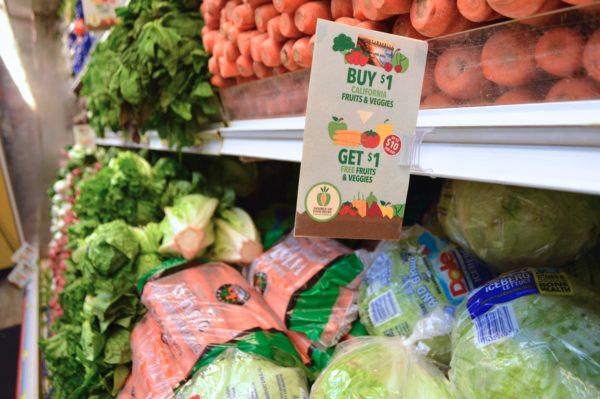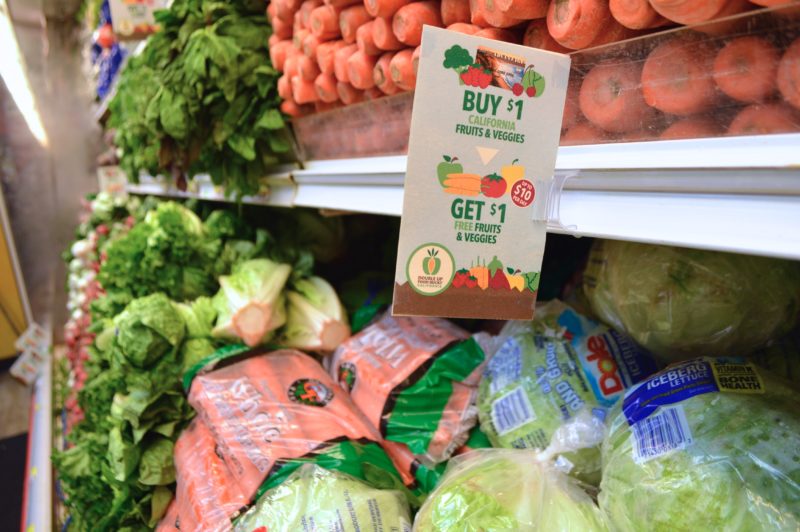
Second Harvest believes that access to healthy food is a human right and that food is foundational to economic stability and health. As bills are introduced, we will offer a more specific policy agenda, but our principles, key issues and opportunities that allow us to better fight hunger in California and nationally are outlined below.
Visit SHFB.org/advocacy for more information.
NATIONAL
SNAP/CalFresh: Continue to protect and strengthen this important supplemental grocery benefit program.
- Oppose regulatory cuts or public charge: After a strong farm bill was passed, the administration has continued to attack CalFresh through regulatory changes. We oppose time limits, public charge restrictions and any other federal attacks on the human right to food.
- Increase CalFresh benefits to reflect food costs: HR 1368 (Closing the Meal Gap Act of 2019) would increase the benefits for CalFresh by increasing the meal cost assumptions.
- Increase CalFresh for children during summer months: Children who receive free and reduced-price meals (FRPM) during the school year end up hungry in the summer — only 14% have access to summer meal programs. Pilots have shown that providing families with additional CalFresh benefits on their electronic benefit transfer (EBT) cards in the summer ensures that children are better nourished. We advocate for expanding this program to all 50 states.
School meals: Universal, free school meals are our long-term goal. Universal school meals would reduce stigma, which would increase participation in meals and ensure that all children are well-nourished and ready to learn. Currently, only children who are below 185% of the federal poverty level can receive free or reduced-price meals at school. Many children in need are not eligible, and the paperwork is intimidating for families and arduous for school districts. We hope the child nutrition reauthorization will be delayed until 2021, when this vision of universal meals may be more likely to become a reality.
We oppose any effort to block grant school meal programs. School meal programs depend on entitlement status and guaranteed federal reimbursement to ensure all students have access to the nutrition they need.
Summer meals: Summer meals help keep children well-nourished when school is out. Fully funding these programs in low-income areas is an important priority and we also want to work to create adjustments for local cost of living.
The Emergency Food Assistance Program (TEFAP): The federal TEFAP program is an important source of food for food banks. We advocate for strong funding, including a $100 million allocation for food banks to assist with the costs of TEFAP storage and distribution to low-income communities.
Extend individual charitable deductions: Extend the federal individual charitable deduction to all taxpayers subject to a minimum giving floor.
STATE
Increase CalFood allocation: This state support would enable food banks to purchase $24.5 million worth of California-grown produce annually to feed those in need.
Increase food bank infrastructure capacity: We support state-provided, one-time funding of $20 million to expand the capabilities and capacity of California’s food bank network.
Expand the food donation tax credit: AB 614 (Eggman/Salas) would expand the Farm to Food Bank tax credit for produce to include other California-grown foods such as a dairy, eggs, rice, nuts and meat. This would improve health and reduce food waste by expanding the variety of healthy foods donated to food banks.
CalFresh enhancements: These state CalFresh bills will help California better leverage federal dollars.
- Ensure equitable access to CalFresh: SB 285 (Weiner) would ensure that all eligible Californians have efficient, equitable access to CalFresh by phone, online and in person in every county. The bill also encourages simplified applications for people who are elderly, and better-integrated applications across social service programs.
- Simplify verification of housing expenses: AB 494 (Berman) would require simplification of the housing expense deduction utilized when CalFresh benefits are determined, decreasing paperwork and maximizing benefits.
- Provide state benefits for individuals subject to time limits on CalFresh: AB 1022 (Wicks) would provide a state benefit equivalent to CalFresh for people who become ineligible for CalFresh due to federal time limits for able-bodied adults without dependents (ABAWDs). It would also continue access to work and training opportunities.
- Educate college students about CalFresh: AB 1278 (Gabriel) would require CSUs and community colleges to notify their students through the school’s intranet that they may be eligible for CalFresh, housing resources and mental health services. This could help end college hunger.
- Expand CalFresh use in restaurants: AB 942 (Weber) would expand the CalFresh Restaurant Meals Program from a county option to a required, statewide program. This program can be used by CalFresh recipients who are homeless, elderly or disabled and unable to cook for themselves.
- Implement California fruit and vegetable EBT pilot project: Ensure the timely implementation of this pilot by the California Department of Social Services. These incentives on California-grown produce make healthy food more affordable for families with low incomes.
School and summer meals:
- Provide incentives to schools to purchase California-grown produce: SB 499 (McGuire) would increase reimbursement for school meals that use California-grown produce. This helps school meal programs be fiscally sound, while providing nutritious food for children.
- Ensure preschool and childcare meals for all kids: AB 842 (Limon/Eggman) would ensure that all children in public preschools have access to at least one school meal, and increase reimbursement for childcare providers who utilize federal meal programs so they can provide healthy meals.
- Expand Breakfast After the Bell grants: AB 1508 (Bonta) provides infrastructure and capacity grants to high-need schools that could feed more students by serving breakfast after school starts.
ADMINISTRATIVE SUPPORT
Improve direct certification: Work with our school districts and counties to ensure that all eligible students are properly identified and increase access to free and reduced-price meals. This will also allow more schools to offer universal school meals.
Simplify free and reduced-price meal forms: Work with the state to design simpler forms that don’t intimidate families, and de-emphasize the optional Social Security number question.
Expand CalFresh to SSI recipients: Work closely with our counties to enroll SSI participants in CalFresh, a historic opportunity to increase the food security of people who are elderly or disabled.
